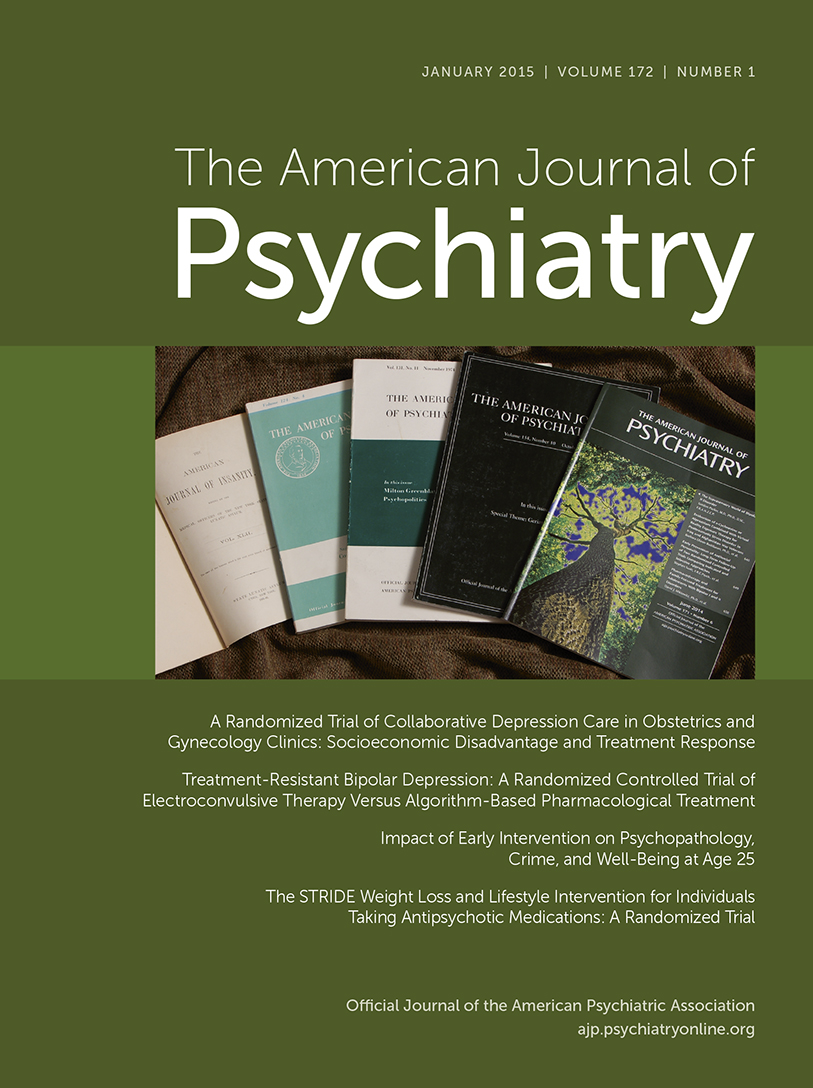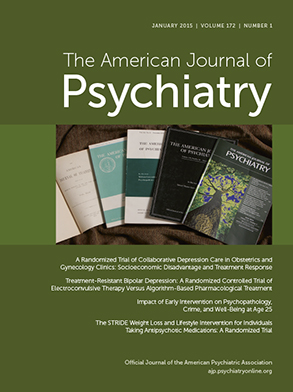Suppose you are poor, unemployed, and poorly educated. You cannot afford health insurance. You are depressed, and even if you knew where to go for help and could get there, you are afraid your family and friends will label you crazy or foolish. How would you get help?
In this issue, Katon et al. (
1) present the results of their research on whether attendance at an obstetrics-gynecology collaborative care clinic can effectively help disadvantaged women with no insurance or with only public coverage who meet criteria for major depression or dysthymia. The study’s comparison group were depressed women with commercial health insurance. Women at two different sites were assessed at intake and then followed up 18 months after initial recruitment.
Not only did all of the women in the study show improvement in their depression scores, the disadvantaged group demonstrated a much greater effect size in depression improvement than the group with commercial insurance (0.81 compared with 0.39). The marked difference between the two groups may have occurred because the disadvantaged group started with higher levels of depression as a result of the greater number and variety of personal stressors they have. Nevertheless, the study showed that socially disadvantaged women can obtain and benefit from help received in such a collaborative care setting.
Collaborative care models vary. In this case, master’s-level social workers were trained to act as the care providers. Depressed women were given initial education about depression, and a semistructured interview was used to obtain a history. Women had choices as to whether they preferred psychotherapy or medication and whether they wished to be followed up in person or by telephone. The social workers helped with barriers to care, such as transportation and housing problems and inability to afford medication. Consulting psychiatrists advised the clinic physicians about medication changes.
Collaborative or integrative care appears to function best when case management is involved to provide a strong clinician-patient relationship (
2). Case management is defined as “a collaborative process of assessment, planning, facilitation, and advocacy for options and services to meet an individual’s health needs through communication and available resources to promote quality cost-effective outcomes” (
3). Although research on the benefits of system-level integration is limited (
2), the combination of case managers and a psychiatrist consultant to recommend treatment seems to yield the best results. The Katon et al. study therefore used an ideal approach. It is also one of the few studies of collaborative care for depression that have looked at reimbursement issues.
The study highlights a number of issues regarding health insurance, stigma, and women’s mental health. Concerning the insurance issue, it may not have been possible to carry out this study in any other major developed country, as most have a health insurance scheme that covers all patients. In Canada, for example, every citizen and anyone legally in the country may apply for health insurance to cover all necessary visits and procedures. Insurance status is not an obstacle to care. The Affordable Care Act may correct some of these obstacles in the United States, providing millions of uninsured people with mental health coverage.
Universal health coverage does not, however, eliminate stigma. For many individuals, negative feelings, fears, and misinformation about psychiatric illness interfere with access to care (
4,
5). While highly educated individuals may find it fashionable to have their own therapist, disadvantaged groups may feel ashamed or embarrassed at the thought of seeking psychiatric help. Paradoxically, although their personal and financial struggles may make them more vulnerable to developing depression or anxiety, their fears and shame may make them less likely to seek help.
Choosing an obstetrics-gynecology practice as the site for developing a collaborative care program is especially wise. Not only do many women use their gynecologists as their primary physicians, these physicians also treat women for life events that are closely linked to their well-being. Women are most likely to experience depressive symptoms in the premenstrual period (
6), the postpartum period (
7), and during the perimenopause (
8). Depression requiring treatment often occurs during pregnancy (
7). Miscarriage (
9), infertility (
10), or stillbirth (
9) can all result in mental health problems. Concerns about the safety of psychotropic medications in pregnancy may lead some physicians to discontinue them, which may leave the patient at greater risk (
11).
On the other hand, obstetrician-gynecologists also need to know when women do not need intervention. For women seeking abortion, some states now require doctors to warn women that they may become depressed and suicidal if they have the procedure. Neither of these predictions is true (
12). Working in a collaborative care model will assist obstetrician-gynecologists to recognize mental health problems where they exist as well as to differentiate between mental health realities and political beliefs.
Unfortunately, ideal programs such as those studied by Katon et al. may not become part of general clinical practice soon. However, as health care systems become increasingly focused on improving their patients’ health while containing costs, these programs may become increasingly valued.

